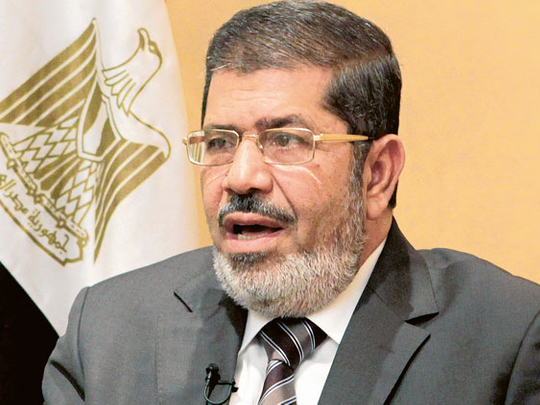
Cairo: Egyptian President Mohammad Mursi on Saturday disputed claims that his country is on the verge of economic collapse, saying that Egypt’s banking system is in a safe shape.
“You who are talking about (Egypt’s) bankruptcy, you are the bankrupt ones,” he said in his first address to parliament since taking office in June. “Egypt will never go bankrupt or kneel, God willing, so long as Egyptian people are productive, vigilant and know well what they are doing.”
Mursi said that the country’s foreign currency reserves reached $15.5 billion (Dh56 billion) in November, a 1.1 per cent increase against July.
“How can a country like Egypt go bankrupt while it fulfils its financial obligations?” he told the upper house of parliament or Shura Council.
He added that the Egyptian economy grew by 2.6 per cent in the first quarter of the new fiscal year starting in July, compared to 0.3 per cent in the corresponding period of the previous fiscal year.
Earlier this month, the rating agency Standard and Poor’s downgraded Egypt’s long-term rating from B to B-, a move that has triggered worries over the country’s economic situation.
The Egyptian government also asked the International Monetary fund to delay negotiations on a $4.8 billion loan, badly needed to regain investors’ confidence in the national economy. The government said the delay was prompted by the need for holding a societal dialogue on austerity measures including tax hikes and subsidy cuts.
Mursi said on Saturday that the adoption of a new constitution marks an end to a transitional period that “was longer than necessary”. The Islamist-backed charter was approved last week by 63.8 per cent of those who voted in a two-stage referendum.
The opposition said the constitution, Egypt’s first since Hosni Mubarak’s toppling almost two years ago, is too Islamist, undermines fundamental freedoms and ignores women’s rights.
The new constitution has given Shura Council, dominated by Mursi’s Islamist allies, the legislative power until a legislature is elected in two months.
“I call on you to work seriously and cooperate with the government and hold a dialogue with all parties, political powers and societal institutions,” Mursi told the plenary session attended by several public figures. Key opposition leaders stayed away from the gathering to protest Mursi’s policy.
Main items on the Shura’s agenda include a draft law regulating the coming legislative vote.
Mursi on Saturday renewed his call for the opposition to engage in national dialogue talks. “Building a modern state after autocracy, corruption and dictatorship cannot be undertaken without all forces of society joining hands.”
The main opposition bloc, the National Salvation Front, had previously rejected Mursi’s call, saying it lacks a clear agenda.
“I renew my call for all parties to join the national dialogue, which I am sponsoring, and actively engage with this esteemed council so that the new election law will be expressive of all parties and a guarantee of fair polls,” he said.
The opposition claimed that the December 15 to 22 referendum on the draft constitution was marred by massive violations.
Meanwhile, Egypt’s finance minister announced on Saturday that his country has received a final $500 million instalment of funds promised by Qatar, and will get another $500 million from Turkey at the end of January in the latest aid to help balance its budget and defend its currency.












